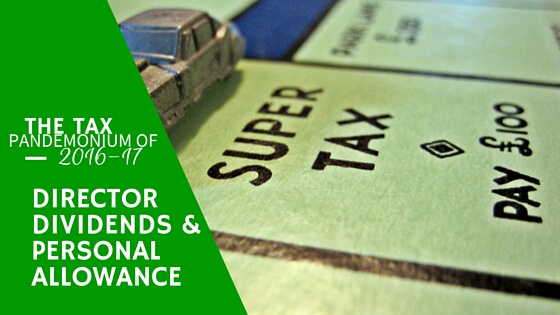Director Dividends – The Tax Pandemonium
- August 5, 2016
- Posted by: Gary Parsons
- Category: Pay, Reward & Benefits

There has always been misconception and confusion in the history of Director Dividends and personal allowances. We can all see how scary this new practice of dividends & first-time tax could panic you – which is why we want to offer the best support for our clients (accountants and directors alike) and provide accurate & helpful services to accommodate your needs.
What’s changed to Director Dividends?
In 2015 – If you were a Director of a Limited Company, even without any employees, you could take out a wage and dividends – a wage of up to £883.33 a month (including Employer Allowance), with dividends of up to roughly £32,000 – all of which would have been completely tax/ni-free.


Going forward into 2016-17, this has all changed – drastically.
Here are a number of notable changes:
- Employers Allowance has increased from £2000 to £3000;
- You must have an employee in addition to the director, and the employee must be paid above £156 per week, then the £3000 Employment Allowance would be available.
- Dividends are tax-free up to £5,000;
- Dividends above the tax-free threshold but below £43,000 is hit with a 7.5% taxation.
Due to so many changes coming into play, such as taxable Director Dividends, we have seen a number of Directors going into panic mode and cutting their income down, strictly abiding the tax-free limit of £671.00, without Employers Allowance. Most evidently, this includes a number of people scouring Google and looking for that ‘magic tax-free recipe but it’s not always that easy!
Get Support from a responsive UK Payroll Company
Remember – Dividend thresholds for 2016-17 are as follows:
- £0 – £5,000: Tax-free
- £5,000.01 – £43,000: 7.5% Tax
- £43,000.01 – £150,000: 32.5% Tax
If you’re trying to be tax-efficient with your personal allowance & Director Dividends – there isn’t an easy way of getting out of paying tax anymore, unless you take £671 as a personal allowance each month, and then take £5,000 dividends. That is the only avenue that you can take to avoid having to pay tax on your income but we’re constantly listening to our accountancy partners on ideas to identify this.
Disclaimer: This article is written to show only provisional figures/thoughts on the subject and do vary from scenario to scenario. We accept no liability for the use of the accuracy of this information and always recommend you confirm figures officially before proceeding. It is also an offence to avoid paying tax and you should seek professional advice before making any commitments in calculating pay at these levels.
If you would like a personalised calculation, based on your dependant scenario, then please call us on 0333 358 3414 or drop us an email at [email protected] and we’ll do our best to assist where we can.





